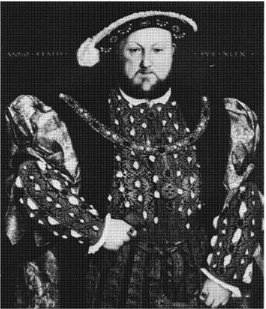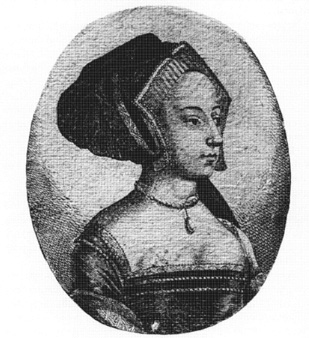A World Lit Only by Fire (38 page)
Read A World Lit Only by Fire Online
Authors: William Manchester

Henry’s blows against Lutheranism and English heresy were appreciated in Rome. The king had expected them to be, and had

King Henry VIII of England (1491–1547)
let Rome know that he would welcome a quid pro quo. Earlier pontiffs had designated the rulers of Spain as “Catholic Sovereigns”
and French monarchs as “Most Christian.” Henry wanted something along that line, and Pope Leo gave it to him, bestowing upon
him and his successors the title
Defensor Fidei
, Defender of the Faith. Henry ordered this struck on all English coins, and because kings rarely return anything once it
is in their grasp, the rulers of England have kept the honorific ever since,
*
though within a dozen years of its conferral the Holy See very much wanted it back.

I
N THE POPULAR
imagination, Henry VIII and Martin Luther have been yoked as leaders of the Reformation, though each would have deeply resented
the coupling, and in fact they do not belong together. Luther was a theological rebel. Henry remained a faithful Catholic
in every particular except one. He rejected the supremacy of Rome because the pontiff—for political, not religious reasons
—resisted what the king regarded a royal prerogative. There is much to be said in Henry’s behalf and very little in the pope’s,
but the motives of both have been muddied, as often happens when romance rears its violin-shaped head.
The immediate issue was Henry’s decision in 1527 to dissolve his eighteen-year-old marriage to Queen Catherine, Catherine
of Aragon, the daughter of Ferdinand and Isabella of Spain. His motive would not be acceptable to later ages, but it was then.
Medieval sovereigns were expected to function as national stallions, providing heirs for their thrones. This was particularly
important in Henry’s case. The dreary, thirty-one-year War of the Roses between the Yorkists and the Lancastrians had ended
only six years before his birth, and his family’s claim to the monarchy was shaky; if he died without male issue, England
would almost certainly be ravaged by civil war again.
Unfortunately Catherine, now forty-two, had proved an incompetent conceiver of healthy boys. Her only child to survive infancy was a girl. Henry knew the problem did not lie with him. In 1519 he had sired a bastard boy by his first royal mistress,
Elizabeth Blount, the sister of William Blount—Lord Mountjoy, Erasmus’s patron. Though adulterous, this and Henry’s other
affairs were sanctioned by custom; unwritten law held that when royal marriages had been contracted for reasons of state,
either party might seek diversion elsewhere. But there was another consideration. Assuming that his queen would bear children
of both sexes, the king had betrothed their small daughter, Mary, to the dauphin of France. Should Henry die without leaving
a son, Mary would inherit the English throne, and when her husband was crowned king of France, the British island would, in
effect, become a province of France.
The annulment he sought required Rome’s consent, but that should have presented no problem. Papal dispensations were not uncommon;
the usual procedure was to find some flaw in a marriage which would permit an annulment or a divorce. In Henry’s case the
flaw was genuine. Catherine was the widow of his older brother Arthur, and English canon law prohibited such a marriage, taking
its precedent from the book of Leviticus (20:21): “If a man shall take his brother’s wife it is an unclean thing … they shall
be childless.” The Vatican had provided a dispensation permitting Henry to wed her, but it was doubtful that the pontiff had
possessed the power to overrule the scriptural ban, particularly since the queen’s fruitlessness seemed to have fulfilled
its prophecy. The king said that the dispensation, and therefore his union with Catherine, had been illegal. Theologians on
both sides of the Channel agreed with him.
In Rome, however, the prospect of an English royal divorce bore distasteful political implications. Pope Clement was struggling
to recover from the sack of the holy city, where, largely as a result of his own blundering, his situation had become highly
complicated. If the pontiff agreed, he could anticipate a highly unpleasant confrontation with a ruler even more powerful
than Henry: the Holy Roman emperor, whose domains sprawled across the Continent, and whose armies had now twice defeated the
French in disputes over Milan, Burgundy, Naples, and Navarre. The undisputed master of Italy, Charles V literally surrounded
the Vatican and therefore was, in proximity alone, bound to intimidate any pontiff, particularly at a time when the papacy
was deeply involved in regal intrigues. Clement was a captive pope, and the emperor’s views would be given great weight, especially
if they were strongly held.
In this case they were. Charles’s childhood tutor, the future Pope Adrian, had instilled in him a solemn reverence for the
Vicar of Christ. Catherine was his aunt, and he was incensed by the argument—unwisely presented to the Vatican by Henry’s
legate—that because she had been Arthur’s widow, her marriage was not only invalid but actually incestuous. Should the Vatican
accept this reasoning, she would be reduced to the level of a discarded concubine, and her daughter, Mary, England’s heir
apparent, Charles’s cousin, would become illegitimate. If Clement denied papal permission, Henry would be blocked—unless,
of course, he quit the Church, a possibility which seems to have occurred to no one except him until he had publicly committed
himself. It came as a shock to prominent English Catholics, confronting them with an agonizing choice between their faith
and their monarch. No one who knew Henry expected royal sympathy for their dilemma, and there was none; when the humanist
Juan Luis Vives spoke up for Catherine, he was dismissed as Mary Tudor’s teacher and banished from the court.
None of Henry’s predecessors would have dreamed of breaking with Rome, but he was a man of immense determination, and his
resolve was strengthened by his choice of, and infatuation with, Catherine’s successor: Anne Boleyn, a nobly born nineteen-year-old
girl remarkable for her flashing eyes, long, flowing hair, and vivacity. Here his judgment was gravely flawed. Superficially,
Anne seemed qualified for the throne. The daughter of a viscount and granddaughter of a duke, she had been educated at a Paris
finishing school and had served as lady-in-waiting, first to Marguerite of Navarre and then, back in England, to Catherine.
She was witty and gay. But she was also flighty, self-centered, and, by all accounts, lascivious.
It was her sexuality which had attracted Henry to her. The Boleyn women were noted for their libidos; both Anne’s mother and
her older sister had slipped naked into the king’s bed, to his subsequent delight, but her lovemaking skills eclipsed theirs.
To him this wanton girl seemed built to breed. He was convinced that once the Holy See had sanctioned a royal annulment, freeing
him to wed her, crown her, and impregnate her with a scion, England would be guaranteed a future sovereign to rule an England
at peace. What he did not know—then—was that despite her youth she was as experienced as he was. Before she seduced him,
her many lovers had included the poet Thomas Wyatt and Henry Percy, the future Earl of Northumberland. Even in what one historian
of Hampton Court describes as “exceedingly corrupt court revels,” she was notoriously available to both single and married
courtiers. Indeed, there is evidence that when the king designated her his queen-elect, she and Percy were already secretly
married.
Because of this—and much more of the same, which was to follow—the king’s decision to abandon Catherine led to the messiest
divorce in history. Yet had Anne Boleyn never existed, Henry would still have found a new queen. He had begun to consider
changing wives as early as 1514, when Anne was a child of seven; when he quit Catherine’s bed in 1524, it was to sleep with
Mary Boleyn, not her younger sister. Three more years passed before he took Anne as his mistress and made the first, tentative
inquiries about a dispensation from Rome.
His hopes were vested in his lord chancellor, Cardinal Wolsey. Wolsey sympathized with the king’s yearning for a son and had
his own candidate for the succession, the French princess Renée, daughter of King Louis XII. Privately the cardinal was appalled
by Anne. He was familiar with her reputation, and by now the king must have heard at least a whisper of it. But to a monarch
with Henry’s pride it would have been inconceivable that any queen of his would be tempted—let alone dare—to contemplate
infidelities. Furthermore, by now he was in love with her.
Wolsey badly needed a success. Once considered invincible, the lord high chancellor was now seen as a leader of lost causes.
His wars had alienated the Commons and the merchants, his dictatorial manner had offended the clergy, and his foreign policy
—rejecting Charles V for a French alliance—had proved disastrous. Had he been wise, he would have been unobtrusive. Yet
he could not hide his lack of enthusiasm for what the royal court was calling “the king’s great matter.” Henry, impatient,
bypassed the cardinal and sent his own secretary, William Knight, to Rome. Knight, speaking for his sovereign, submitted his
case to Pope Clement. The pontiff, he argued, should declare Henry’s present marriage invalid. In any event, he proposed,
the matter should be decided in England. His Holiness agreed. Knight then suggested that an eminent prelate serve as judge
and make the final ruling. He had Wolsey in mind. The pontiff knew it. He also knew that for seven months of the previous
year he and his retinue had been holed up in Sant’ Angelo while Rome was sacked. The troops still surrounded the city, and
their commander was the English queen’s

Anne Boleyn (1507–1536)
nephew. If Clement yielded to Knight’s other point, he would be inviting the wrath of Charles V. Yet he could not leave the
English cardinal out. Therefore, Clement ruled that
two
members of the sacred college should preside. Wolsey would be joined by an Italian cardinal, Lorenzo Campeggio. This was
a stunning loss of face for Wolsey, and when Anne turned against him he was a ruined man. Henry seized his palace at Whitehall
and stripped him of his secular offices. He was allowed to retain the archbishopric of York. After a year the king ordered
his arrest. Ill, Wolsey died on the way to London.
In the meantime, Cardinal Campeggio had found the English sovereign immovable. “This passion,” he wrote the pope, “is the
most extraordinary thing. He sees nothing, he thinks of nothing but his Anne; he cannot be without her for an hour.” Nevertheless
Henry, willful but astute, had been proceeding shrewdly. He had appointed a commission to gather legal opinions from Catholic
scholars all over Europe, and confronted the pontiff’s representative with the fact that they backed him, without exception.
Campeggio agreed that England deserved a fertile queen. He urged Catherine to retire to a nunnery. She agreed—provided Henry
enter a monastery. The cardinal was offended. He knew she could not be serious; the thought of Henry VIII resigning himself
to obedience, chastity, and poverty was absurd. What the cardinal did not realize was that Catherine’s intractability, supported
by her imperial nephew and his captive pope, meant that from this point forward the likelihood of England’s defection from
Catholicism would increase month by month.
